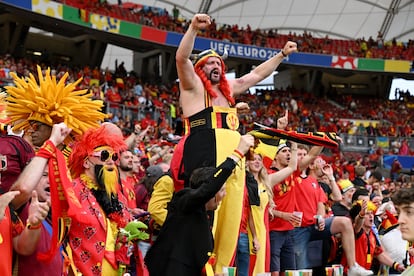Soccer fans take back the sport at Euro 2024 with record ticket sales and back-to-the-roots attitude
UEFA has already sold 2.3 million tickets for a championship where people don’t have to trek across Europe, as in 2021, or put up with phony fans, as at the Qatar World Cup


On the Karplatz in Düsseldorf, an Italian man shows off his juggling abilities with a foam ball with which he challenges any fan wearing a shirt that is not blue. A few meters further away, waiters are also doing balancing acts with their trays as they weave among high wooden tables where mugs of beer, sausages and meatballs evidence how this international sporting competition is also being settled with drinks and identity songs.
Based on demand and ticket sales, UEFA has proclaimed that Euro 2024 is on track to break the record of 2,427,303 fans who attended the stadiums in France for the 2016 edition of the European soccer tournament. Just before the draw of 24 participants had been completed, with more than 50 million ticket requests in the two application phases, UEFA Euro 2024 officially became the most demanded UEFA European Championship of all time, the organization said in a statement. UEFA sold 2.3 million seats to the general public and to fans of the teams before the tournament even began.
After the 2021 multi-venue Euro Cup that expanded the tournament to the four cardinal points of the continent, with pandemic restrictions still prevailing in most of the organizing countries, and after the imposture that was felt in many of the luxurious World Cup stadiums in Qatar, filled with fake fans, real soccer fans are back to the purism of their customs. In some way, and despite the inflationary problems that have pushed up the cost of food and accommodation, it can be said that fans have taken back soccer in a great competition.
In Germany, in the heart of an old Europe stressed by the war in Ukraine, the Israeli destruction of Gaza, Islamic terrorism and the rise of the far right, the social dimension of soccer has generated the particular recreational oasis that has always been there for fans at major national team competitions. Crowds fill the stadiums without the need for subsidies from the organizing committee; central train stations are hives of nomads who jump from city to city following their teams, and the old city centers of the host cities become melting pots of nationalities that dot the terraces and sidewalks of Berlin, Munich, Stuttgart, Hamburg, Dortmund, Cologne, Leipzig and Frankfurt.
The proliferation of kilts is one of the most distinctive and picturesque features of fandom at this particular championship. On the outskirts of Dortmund’s Wesfalenstadion, Tommy, a forty-something Scot, shows the effects of the sun on his cheeks and calves. “We come from Edinburgh, we are a group of eight who have chosen Dortmund because there are other venues nearby. We go to Scotland’s matches and buy tickets for other games here and around the area. We will be here until the quarterfinals, this is our vacation,” he says while soothing his throat with a can of beer pulled out from a portable cooler.
Supermarkets are another very popular meeting point for the purchase of food and drinks for the less well-off fans. A bottle of the first beer consumed at any of the crowded fanzones or in the kiosks under the stadiums can set you back as much as €9, although €3 are a deposit that is refunded upon return of the glass. Hotels are registering high occupancy rates despite the fact that prices have doubled and tripled at many establishments. The campsites on the outskirts of the host cities have also considerably increased their client numbers.
Without the great distance and high cost of traveling to Qatar, and without the need to travel the breadth and depth of the continent as in Euro 2021, fans are enjoying the gastro-party — and cultural tourism, for those who enjoy it — that always takes place during a Euro Cup or a World Cup. “We have come to celebrate the 50th anniversary of our friend group and we are delighted. People seem to want to enjoy themselves, we go out almost every night and we haven’t seen a single fight. Let’s hope the ultras (violent fans) don’t screw it up,” says David, a journalist from Burgos, Spain. So far, security, with a high number of plainclothes police infiltrated among the fans, has prevented scenes of violence, quickly moving in to quell a few emerging fights. In this aspect, for now at least, fans have also taken back the game.
Sign up for our weekly newsletter to get more English-language news coverage from EL PAÍS USA Edition
Tu suscripción se está usando en otro dispositivo
¿Quieres añadir otro usuario a tu suscripción?
Si continúas leyendo en este dispositivo, no se podrá leer en el otro.
FlechaTu suscripción se está usando en otro dispositivo y solo puedes acceder a EL PAÍS desde un dispositivo a la vez.
Si quieres compartir tu cuenta, cambia tu suscripción a la modalidad Premium, así podrás añadir otro usuario. Cada uno accederá con su propia cuenta de email, lo que os permitirá personalizar vuestra experiencia en EL PAÍS.
¿Tienes una suscripción de empresa? Accede aquí para contratar más cuentas.
En el caso de no saber quién está usando tu cuenta, te recomendamos cambiar tu contraseña aquí.
Si decides continuar compartiendo tu cuenta, este mensaje se mostrará en tu dispositivo y en el de la otra persona que está usando tu cuenta de forma indefinida, afectando a tu experiencia de lectura. Puedes consultar aquí los términos y condiciones de la suscripción digital.








































